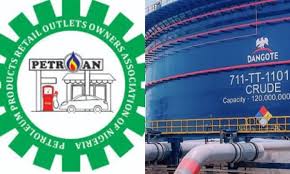The Petroleum Products Retail Outlets Owners Association of Nigeria (PETROAN) has expressed concerns that Dangote Refinery’s forward integration approach to fuel distribution could result in disguised monopoly, threatening jobs and the survival of many independent fuel stations across Nigeria.
Dr Billy Gillis-Harry, National President of PETROAN, stated on Monday that the strategy, if unchecked, could trigger widespread unemployment and force multiple retail outlets out of operation.
Dangote Petroleum Refinery had on Sunday announced a major initiative to reshape Nigeria’s fuel distribution network. Beginning 15 August, the refinery plans to supply fuel and diesel directly to marketers, manufacturers, telecoms firms, aviation operators, and other high-volume users across the country, with free logistics support.
To support this move, Dangote Refinery has invested in 4,000 new Compressed Natural Gas (CNG)-powered tankers. It is also developing a network of CNG stations, known as daughter booster stations, alongside over 100 CNG tankers to eliminate logistics costs and ensure seamless delivery.
Reacting to the development, Gillis-Harry said a facility with a production capacity of 650,000 barrels per day should be competing globally, not acting as a local distributor in the downstream sector.
“This massive refinery, one of the largest in sub-Saharan Africa, is expected to satisfy domestic fuel demand and export surplus products,” he said.
He noted that PETROAN had long warned of Dangote’s potential dominance in the downstream sector, citing fears of price-fixing, restricted competition, and consumer exploitation.
“PETROAN warns that Dangote’s tactics may include a pricing penetration strategy—reducing prices temporarily to capture market share—with the aim of pushing other filling station operators out of business. This could lead to a massive shutdown of filling stations across Nigeria, resulting in widespread job losses,” he said.
Gillis-Harry added that the introduction of 4,000 CNG-powered trucks also threatens the livelihoods of thousands of independent petroleum truck drivers and owners.
While acknowledging that CNG vehicles may reduce transportation costs, he argued that the move would displace many in the sector and undermine modular refinery operations, whose market shares may shrink under Dangote’s dominance.
He warned that truck owners, local suppliers, telecom diesel vendors, and filling station operators could all face shutdowns due to Dangote’s direct supply to end-users.
“It is obvious that Dangote plans to gain full monopoly of the downstream sector, which would enable the company to exploit Nigeria’s petroleum consumers. This could lead to higher prices, reduced competition, and decreased economic efficiency,” he said.
He urged the Nigerian Midstream and Downstream Petroleum Regulatory Authority (NMDPRA) and the Ministry of Petroleum to implement price control measures to prevent monopoly and protect consumer interests.
(NAN)


